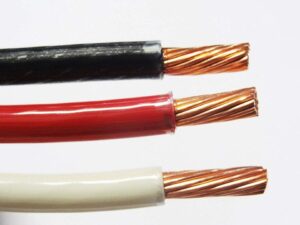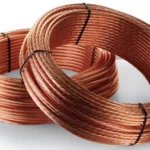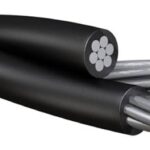When choosing electrical wire for residential, commercial, or industrial applications, you may come across two common types: THHN and XHHW. Both are copper or aluminum conductors used in building wiring, but they differ in insulation material, temperature rating, and environmental performance. In this article, we’ll compare THHN vs XHHW wire to help you understand which is better for your specific needs.

thhn vs xhhw
What Is THHN Wire?
THHN stands for Thermoplastic High Heat-resistant Nylon-coated. It is one of the most widely used wires in building wiring and control systems.
Key Features:
Insulation: Thermoplastic (PVC) with a nylon outer jacket
Temperature Rating: 90°C (dry), 75°C (wet)
Voltage Rating: 600 volts
Jacket: Nylon coating improves abrasion resistance
UL and NEC Compliance: Yes
Typical Use: Conduit, control panels, commercial wiring
What Is XHHW Wire?
XHHW stands for Cross-Linked High Heat-resistant Water-resistant. It is insulated with a cross-linked polyethylene (XLPE) material.
Key Features:
Insulation: XLPE (Cross-linked Polyethylene)
Temperature Rating: 90°C (dry & wet)
Voltage Rating: 600 volts (XHHW) or 1000 volts (XHHW-2)
Water Resistance: Higher than THHN
Typical Use: Wet or damp locations, outdoor conduits, industrial power systems
THHN vs XHHW: Side-by-Side Comparison
| Feature | THHN | XHHW / XHHW-2 |
|---|---|---|
| Insulation Type | PVC + Nylon | XLPE (Cross-linked Polyethylene) |
| Water Resistance | Moderate | High (suitable for wet locations) |
| Temperature Rating | 90°C dry / 75°C wet | 90°C dry & wet (XHHW-2) |
| Flexibility | More rigid | Slightly more flexible |
| Jacket Thickness | Thinner | Thicker and more durable |
| UV Resistance | Moderate | Excellent |
| Typical Applications | Indoor wiring, dry locations | Wet environments, underground, conduit |
| Cost | Generally lower | Slightly higher |
When to Use THHN Wire
Choose THHN wire when:
The installation is indoors and dry
You need lower-cost wire
You’re pulling wires through conduit
Water or chemical exposure is not a concern
When to Use XHHW Wire
Choose XHHW or XHHW-2 wire when:
You need higher moisture and chemical resistance
The wiring will be outdoors or underground
You want higher durability and UV resistance
Local code requires wet-location rating
THHN vs XHHW for Underground or Wet Locations
THHN is not rated for direct burial or continuous wet environments unless it’s dual-rated as THWN-2. In contrast, XHHW-2 is approved for both wet and dry locations, making it a better choice for outdoor conduits, underground runs, and high-moisture areas.
Which Is Better: THHN or XHHW?
There’s no one-size-fits-all answer. If cost is your primary concern and you’re working in a dry, indoor setting, THHN is sufficient. If you need better environmental protection and long-term durability, XHHW-2 is the better option—especially in outdoor, industrial, or damp settings.
Need Help Choosing THHN or XHHW Wire?
At TOT Wire & Cable, we stock a wide range of copper and aluminum THHN and XHHW wires in all standard gauges. Whether you’re working on a new building, industrial upgrade, or underground wiring job, we’ve got the right product at competitive prices.
👉 Browse our THHN Wire and XHHW Wire categories.
👉 Or Contact Us for technical advice or a bulk quote.






1 comment
Vapehardware 08/16/2025
Goodd article. I will be facing some of these issues as well..